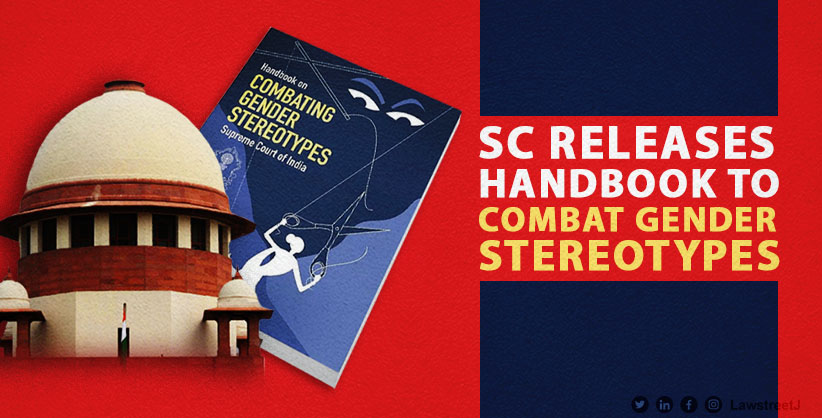NEW DELHI: The Supreme Court on Wednesday released a Handbook on Combating Gender Stereotypes to assist judges and the legal community, stressing judicial reasoning must be based on the individual merits of every case and not on stereotypes."
It also contained a glossary advising against use of words like dutiful wife, concubine, prostitute, hooker, whore, ladylike, keep, mistress, slut etc, in order to help the Indian judiciary identify and mitigate the use of stereotypes and stereotype-enforcing language against women in their decision.
Chief Justice of India D Y Chandrachud made the announcement about the release of handbook. He said this would help in understanding and combating stereotypes about women as it contained a glossary of gender-unjust terms and suggested alternative words or phrases which may be used while drafting pleadings as well as orders and judgements.
"The handbook identifies common stereotypes about women, many of which have been utilised by courts in the past and demonstrates why they are inaccurate and how they may distort the application of the law," he said.
The intention is not to criticise or cast doubt on past judgements but merely to show how stereotypes may unwittingly be employed. Finally, it encapsulates the current doctrine on key legal issues which may be relevant while adjudicating certain cases, particularly those concerning sexual violence, he added.
The handbook identified words which are harmful gender stereotypes particularly about women in judicial decision making and writing. It aimed to sensitise judges against inadvertently furthering gender biases by using these words in legal proceedings. The handbook stressed that the use of stereotypes by judges also has the effect of entrenching and perpetuating stereotypes, creating a vicious cycle of injustice.
The 30-page 'Handbook on Combating Gender Stereotypes' stated, it is vital that judges not only avoid relying on stereotypes in their decision making and writing, but also actively challenge and dispel harmful stereotypes.
It emphasised that if harmful stereotypes are relied on by judges, it can lead to a distortion of the objective and impartial application of the law and this will perpetuate discrimination and exclusion.
We may rely on stereotypes inadvertently, because stereotypes are often internalised and ingrained in our thinking due to societal, cultural, and environmental conditioning. This can make it difficult to identify and avoid relying on stereotypes. However, challenging and overcoming stereotypes is essential to ensuring an equal, inclusive, and compassionate society, it said.
The handbook enumerated several stereotypical words and their alternatives, for example instead of concubine/ keep, the alternate language preferred is woman with whom a man has had romantic or sexual relations outside of marriage; instead of mistress, it is preferred to say woman with whom a man has had romantic or sexual relations outside of marriage; instead of faggot, the judges should accurately describe the individuals sexual orientation (e.g., homosexual or bisexual); avoid words like fallen woman, hooker, harlot etc.
The handbook states that harmful gender stereotypes have to be done away with in court judgments and emphasizes that challenging and overcoming stereotypes is essential to ensuring an equal, inclusive, and compassionate society.
"Even when judges reach legally correct outcomes, the use of reasoning or language that promotes gender stereotypes undermines the unique characteristics, autonomy, and dignity of the individuals before the court. Using stereotypes, instead of objectively evaluating the situation, goes against the constitutional principle of equal protection of laws, which posits that the law should apply uniformly and impartially to every individual, irrespective of their membership to a group or category, it said.
It red-flagged words such as "dutiful wife", "obedient wife", "slut", "spinster", and "ravished". If a judge relies on preconceived assumptions about people or groups when deciding cases or writing judgements, the harm caused can be enormous, it added.
The handbook also listed few assumptions about the traits of women and explains why such notions are incorrect: Women are overly emotional, illogical, and cannot take decisions (stereotype) and a persons gender does not determine or influence their capacity for rational thought (reality); Unmarried women are incapable of taking important decisions about their life (stereotype) and marriage has no bearing on an individuals ability to take decisions (reality).
In his foreword, the CJI said, "I sincerely hope that this Handbook is widely read by all members of the legal profession in India to ensure that legal reasoning and writing is free of harmful notions about women. The Handbook will give a fresh impetus to our quest towards a gender-just legal order, and will be a crucial document to ensure that courts can deliver equal and impartial justice to individuals of all genders."
















